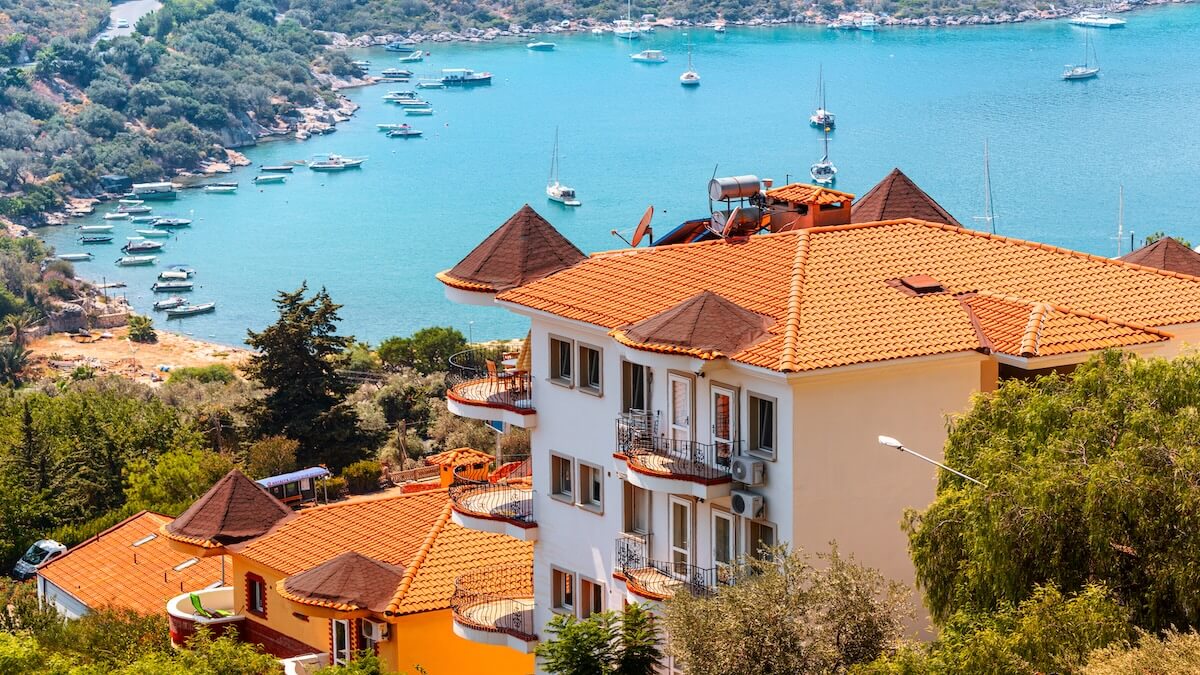How to get mortgage for overseas property as an American
Learn all about different ways to get an overseas property mortgage as an American and gain unique insights to prepare yourself for the whole process.

Buying your first rental property overseas is an exciting way to diversify your investments and earn passive income. International property can offer higher yields, and it often costs less than a comparable property in the US.
Plus, you get the bonus of having your own vacation spot.
However, before you start browsing listings, it's essential to understand the challenges that often come with buying an investment property abroad. If you've been Googling, "how to buy my first rental property overseas," here's everything you need to know.
We'll also introduce Wise — your international money transfer alternative. Use Wise to send stress-free transfers to over 140 countries - all at the standard mid-market exchange rate.
One of the biggest benefits of real estate investing overseas is that you can often buy properties for less money while earning higher rental returns. Here's what to consider:
- Your own vacation rental: Buy a property you can rent out for most of the year and use for your own trips during off-peak times
- Spread your risk: Diversify across different countries, currencies, and property markets instead of putting all your money in one place
- Better prices: Properties in many international markets cost much less than comparable US real estate
- High returns: Vacation rentals in popular destinations often earn 10% annual yields or more¹
- Plan your retirement: Build equity in a place where you might want to live in the future, and earn money now
At the same time, it's important to approach the process of buying a rental property overseas carefully. You'll need to research local regulations, figure out financing options, understand tax rules, and set up a reliable property management system.
Most countries welcome American property buyers, and some even offer residency benefits as a bonus.
For example, when you buy property in Costa Rica for at least 150,000 USD, you can get residency for you and your family members.² This means you can stay in the country for longer or even relocate in the future.
At the same time, it's much harder to buy property in Canada and get residency rights. If you want to come and stay at your property for a long period of time, you’ll need to make sure you have a proper visa.
Some countries make it harder than others for foreigners to buy property. For example, in the Philippines, foreigners can't own land, which limits you to condos and makes buying houses or villas much more complicated.³
In other words, make sure to check ownership and visa restrictions in the countries you're considering.
Taxes are another important consideration. You'll need to research how much you'll pay in property taxes and rental income taxes in your target country.
| 💡 Since the US taxes its residents and citizens on worldwide income, look for countries that have tax treaties with the US. These can help minimize your overall tax burden and prevent double taxation on your rental income. |
|---|
Before you fall in love with a property, you should research the local market to understand its rental potential. Here's what to consider:
- Tourist demand: Look for destinations with steady and growing tourism
- Local rental regulations: Some cities limit short-term rentals or require special licenses
- Property management availability: You'll likely need reliable local help to manage your property
- Currency stability: Avoid countries with volatile currencies that could eat into your returns, especially if your rent will be charged in a foreign currency
- Location: Properties near city centers, beaches, or other popular spots tend to perform better
Another important factor to consider is rental yields.
Rental yield is the percentage of your property's value that you earn in rental income. It's basically how much money your property makes compared to what it's worth.
For example, if you buy a 100,000 USD property and earn 8,000 USD in annual rent, that's an 8% rental yield.
Here are the top 10 gross rental yields by country for city center properties:
| Country | Gross rental yield⁴ |
|---|---|
| Cuba | 24.0% |
| US | 11.7% |
| South Africa | 10.3% |
| Cameroon | 9.2% |
| Venezuela | 9.0% |
| Panama | 8.7% |
| Kyrgyzstan | 8.5% |
| Georgia | 8.1% |
| Kazakhstan | 7.8% |
| Ireland | 7.7% |
Now, high rental yields look attractive, but it's important to think critically.
| For example, Kyrgyzstan has an average rental yield of 8.5%, which is great, but the average monthly rent for a 1-bedroom apartment in the city center is only ~486 USD when you convert KGS into USD.⁵ |
|---|
In other words, even with a high yield percentage, you're not making a lot of rental income by US standards. Make sure to look at the rental yield, but also consider the amount of money you'll earn, not just the percentage returns.
If you need financing to buy your rental, getting a mortgage for an international property is harder than qualifying for your typical domestic mortgage. Some US banks won't lend for overseas properties, and some will do it, but with unfavorable terms.
Here are a few financing options you can consider:
- Local mortgage: Get a mortgage from a bank in the country where you're buying
- US bank international mortgage: Some US banks offer international mortgages, so check with your bank first
- Developer or seller financing: In some countries, like Mexico, developers or sellers will finance the purchase directly, but the terms are usually much shorter than a traditional mortgage
- International mortgage lender: Specialized lenders focus on cross-border mortgages but often charge higher interest rates
Some foreign investors pay in cash, but that's not realistic for most people.
You can still buy an international rental property with financing, but be prepared to research your options thoroughly and potentially face higher costs and stricter requirements than with a domestic purchase.
Now that we covered some of the basics, the only question left is how to send money to pay for your property overseas.
Wise offers you a quick, secure and transparent way of sending money abroad. You get the mid-market exchange rate for your payments and see how much it’s charged for the transfer before sending the money from your bank.
With the Wise Account you can also hold 40+ currencies, spend money in 150+ countries, and receive like a local in 8+ different currencies.
Please see Terms of Use for your region or visit Wise Fees & Pricing for the most up to date pricing and fee information
Take a look at a few different properties to find a good fit for your goals. Consider these key factors:
- Location: Properties near beaches or city centers attract more renters but often cost more, too
- Rental demand: Some locations, like France, have year-round demand, and others are highly seasonal
- Local rental regulations: Check if short-term rentals are allowed and what licenses you'll need (if any)
- Infrastructure: Reliable internet, water, and electricity are important for rental success—these can be a problem in some tropical countries
It's also important to think about the property type that you want to invest in. While this varies from country to country, generally speaking, you'll be choosing between a condo/apartment building, a house/villa, or a beachfront property.
Here's how they compare:
| Property type | Pros | Cons |
|---|---|---|
| Condo/apartment | Lower maintenance, building security, and shared amenities (like pools and gyms) | HOA fees, less privacy, and you need other owners' votes for decisions |
| House/villa | More privacy, full control, and you can charge higher nightly rates | Expensive maintenance, especially from afar |
| Beachfront property | Premium rental rates, high demand | High maintenance due to salt water/air, natural disaster risk |
Remember that things will inevitably break down in your rental property. Budget for regular maintenance and have reliable local contacts who can handle repairs quickly.
Once you've found a property you like, thorough due diligence will help you avoid costly mistakes. It's often a good idea (and, in some countries, a necessity) to hire a local lawyer who specializes in real estate. They'll help you navigate the entire process.
Your lawyer needs to verify clear title ownership and check for any liens or encumbrances, especially in certain countries, where title scams are common.
You'll also need to transfer money for your property purchase from the US.
Whether it's the full amount or the down payment, if you're getting financing, international transfers for large amounts come with high fees. Currency exchange rates also add a hefty cost to your transaction.
Managing a property from thousands of miles away is often tricky, and you essentially have 2 options: hire a property management company or manage the property yourself.
When you hire a property management company, they handle everything on your behalf, including maintenance, marketing your property, and dealing with any problems that come up with the tenants.
However, you'll have to pay them a fee.
| Usually, property managers charge around 10% of your rental income, plus any additional expenses for emergencies. Short-term rentals come with higher property management fees, usually between 15% to 40% of your rental income.⁶ |
|---|
When you manage your property yourself, you keep all the rental income and have full control over your property and guest experience. But this can be difficult when you're in the US and your investment property is in another country.
You'll need to build relationships with trusted local contractors and get in their good graces so they take care of your guests or maintenance problems and emergencies quickly.
Managing long-term tenants is easier than short-term rentals because you won't need to schedule cleanings or prep for check-ins/check-outs. If you want to avoid using a property manager, it might be easier to rent your property long-term.
Your expenses will vary depending on the country where you're buying your rental property. Here are a few costs you should research beforehand:
- Down payment
- Closing costs
- Property inspection
- Legal fees
- Property taxes
- Furnishing and setup
- Insurance
- Ongoing property management
- Currency exchange rates
Your real estate agent and lawyer should be able to provide you with an estimate of the costs you'll encounter during the buying process.
However, one expense that many real estate investors underestimate when buying a property abroad is international money transfers and currency exchange rate markups.
When you send money overseas, banks often make money by giving you a worse exchange rate than the mid-market rate.
| For example, if the USD to EUR exchange rate is 0.92 (meaning 1 USD gets you 0.92 EUR), your bank might only give you 0.89 EUR and keep the difference as profit. |
|---|
This might seem small, but on a 200,000 USD property purchase, that 3-cent difference costs you an extra 6,700 USD.
This hidden cost continues to multiply when you receive rental payments in foreign currency and when you need to send money for maintenance or property management fees.
Over time, these currency exchange markups can eat into thousands of USD of your investment returns.
With Wise, you can send secure and trackable large amount transfers to 140+ countries worldwide with transparent fees and the fair mid-market exchange rate.
Have a look at the main benefits for using Wise to send large transfers:
Get a Wise Account
in minutes 💰
Sources
*Please see terms of use and product availability for your region or visit Wise fees and pricing for the most up to date pricing and fee information.
This publication is provided for general information purposes and does not constitute legal, tax or other professional advice from Wise Payments Limited or its subsidiaries and its affiliates, and it is not intended as a substitute for obtaining advice from a financial advisor or any other professional.
We make no representations, warranties or guarantees, whether expressed or implied, that the content in the publication is accurate, complete or up to date.

Learn all about different ways to get an overseas property mortgage as an American and gain unique insights to prepare yourself for the whole process.

Get a full overview of the best property management software systems for small landlords to easily track and manage their overseas property.

What are the best property management software systems for managing student housing? Take a look at our list and choose the most suitable option for you.

Are you thinking about making smart property investment decisions and wondering how rental yield is calculated? Have a look at our guide to find out.

Have a look at the in-depth guide on the Singapore rental yield market and get a detailed breakdown of opportunities in different areas within the country.

What is a good rental yield in the UK for international property investors? Here's a detailed breakdown of different regions and areas within the country.